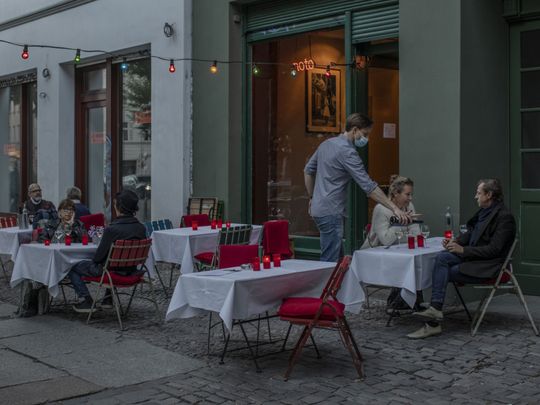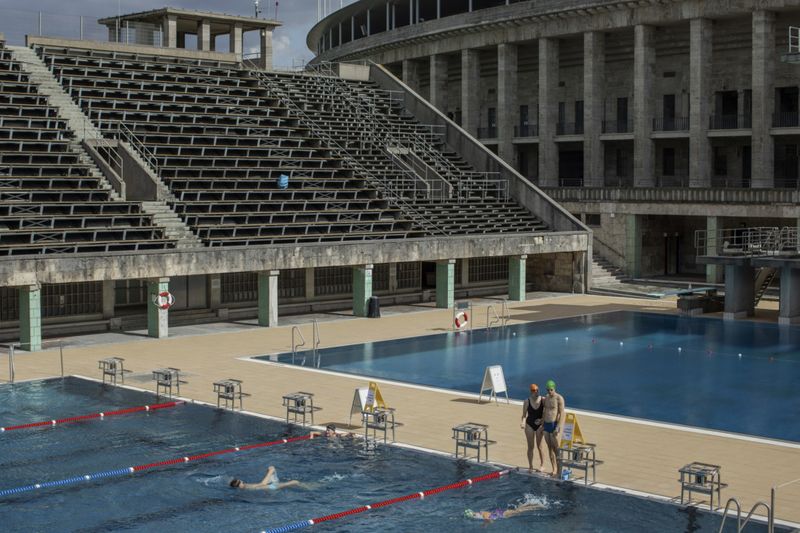
Berlin: I’ve given my phone number to a lot of strangers over the past week.
I scribbled it down for the charming barista who made my latte the other morning. I handed it to the waiter who took my first restaurant booking in more than two months. I gave it to a hairdresser, to an ice cream vendor, even to the guy behind Plexiglas at the open-air swimming pool that just reopened.
“That mask looks great on you,” he said and winked at me over his own mask in one of those I-can’t-believe-I’m-having-this-conversation moments we have every day now.
I swear I wasn’t flirting. I was just trying to have a swim.
Berlin has been emerging from its coronavirus lockdown in full force, and the cost of freedom, the price of having a snippet of our pre-corona lives — date night with your husband, a haircut (a haircut!) — is handing over contact details.
Call them corona logs: A registry of who was where, when and for how long has become mandatory so the detectives of the German health authority can trace the contacts of a newly infected person.
It is one way in which Germany’s new normal looks anything but normal. In a country where privacy is something of a national religion, Germans now casually hand over their private address at every turn of daily life.
At the Refinery, a trendy coffee shop near the river Spree in central Berlin, Sabine Baum, a graphic designer, was adding her details to the dog-eared handwritten list on the counter as she waited for her porridge one recent morning.
“Somehow it feels OK because it’s just on paper and not online,” she said.
Powerful incentive
The longing for normality is a powerful incentive to put up with things that in early March — a lifetime ago — would have seemed either unacceptable or totally absurd to many Germans. Like wearing something in a sauna (face masks might become mandatory when saunas reopen next month).
The lockdown in Berlin was always softer than in neighbouring capitals. Streets and parks emptied, but never completely.
But then streets and parks were never that busy to start with. Less densely populated than Manhattan, London and many Asian cities, Berlin is a mellow metropolis. Long before the virus hit, social distancing was the norm at prominent sights like the Brandenburg Gate (even if we didn’t call it that).
There are moments when Germany feels — almost — normal again. Children walking to school in the mornings. Restaurants buzzing at night. A wedding in a public park. There is even a hint of rush hour as more people trade their home office for their real one.

But one swimming pool now has a traffic light outside its shower area to regulate the number of people inside. Vending machines that used to sell candy and condoms now sell disinfectant and masks. A theatre has removed 500 of its 700 seats to allow for distancing during performances.
There are the drive-in church services and drive-in coronavirus test centers. There are the masks — and the people waving doctor’s notes exempting them from wearing masks.
It’s surreal
In the Tiergarten, Berlin’s equivalent of Central Park, the beer garden has reopened. Walking one recent afternoon toward the cluster of trestle tables on the banks of the Neuer See, a small boating lake, the scene before me was so normal it was surreal. It was busy! Children were taking turns on the wooden swing. A couple of rowboats drifted lazily across the lake.
It was only when I got closer that I saw the Plexiglas dividers on the tables.
“Knock knock!” said the older woman sitting on the other end of our table as she waved to my 4-year-old son through the plastic.
The man at the boat stand was disinfecting a pile of life vests. We, too, rented a boat that afternoon (after writing down our names, address and phone numbers on another dog-eared paper list).
“Can I touch the oar?” my 8-year-old daughter asked uncertainly. She had noticed the couple getting into the rowing boat next to us wearing rubber gloves.
Her question echoed something I heard on the football field, when my older daughter’s team resumed practicing last month.
“The kids ask me, ‘Can I touch the ball? Can I pass the ball?’” said Emilia Rahaus, a 19-year-old coach.
Coronavirus soccer, at least in the amateur sphere, looks nothing like real football. There are no games. The children — seven on each half of the field — train individually with their own balls at clearly marked locations 2 meters apart. The goals are disinfected after use.
“It’s so familiar and yet so different,” Rahaus said. Behind her, on the far end of the field, a banner in the blue-white colour of West Berlin’s traditional football club fluttered in the afternoon breeze: “Youth is our future.”
That motto made me think of the chorus of tired mothers (and it is mainly mothers) at the school gate in the morning. Schools have reopened. But because of distancing rules, classes remain maddeningly sporadic.
My son is allowed only half-days in nursery. One daughter goes to school two days a week, the other 90 minutes a day.
“Home schooling was a breeze compared to this,” one fellow mother sighed.
She recently called in sick at work because the logistics of multiple children with wildly different schedules was just too much. Her husband earns more, so he can’t afford to miss his Zoom meetings, which leaves the burden of child care squarely on her.
“So much for school openings helping parents get back to work,” she said.
And something else has crept into conversations: Is it all necessary?
Successfully contained
Germany has been so successful at containing the pandemic that few people here know anyone who got infected.
“Trust me, it’s just the flu,” a taxi driver told me recently. His mask was casually suspended from the rear-view mirror.
Even our paediatrician called all the precautions “quite exaggerated.”
Every Saturday, an eclectic mix of coronavirus protesters take to the streets to air their frustrations with restrictions. The sight of them — masked and standing 6 feet apart — was telling of yet another new normal: “When we used to protest, we weren’t allowed to cover our faces,” my mother chuckled. “Nowadays you have to cover your face.”
If social distancing during a protest is tricky, try social distancing in the pool. Outside the entrance of my local pool, there was a graphic of what it looks like in theory: four swimmers in a 5-square-meter area of water.
In practice, it looked a little different.
That weird dance we all do on the sidewalk to avoid getting too close to someone? Picture that in a swimming lane.
“Watch your distance!” a man shouted when I overtook him.
I told my husband about it later. A Brit who has been reprimanded more than once for crossing an empty road against a red light, he is convinced most Germans love all the new rules they can now enforce on other citizens.
We were having a date. Our first in corona times.
Before the pandemic, date night had been a fixture of our lives, a long-standing tradition that had carried us through the disruptions of three babies and two intense jobs. Every Friday, an evening of uninterrupted conversation. Call it marital maintenance.
So when our favourite local restaurant reopened after two months of lockdown, it was a big deal, up there with a visit to the hairdresser.
I dressed up in my new face mask, a snazzy number with a flower pattern I had bought specially for the occasion (and that had so impressed the guy at the pool).
It all went well until I went down the one-way system to the bathroom the wrong way and got told off by another patron.
“See?” my husband said.








